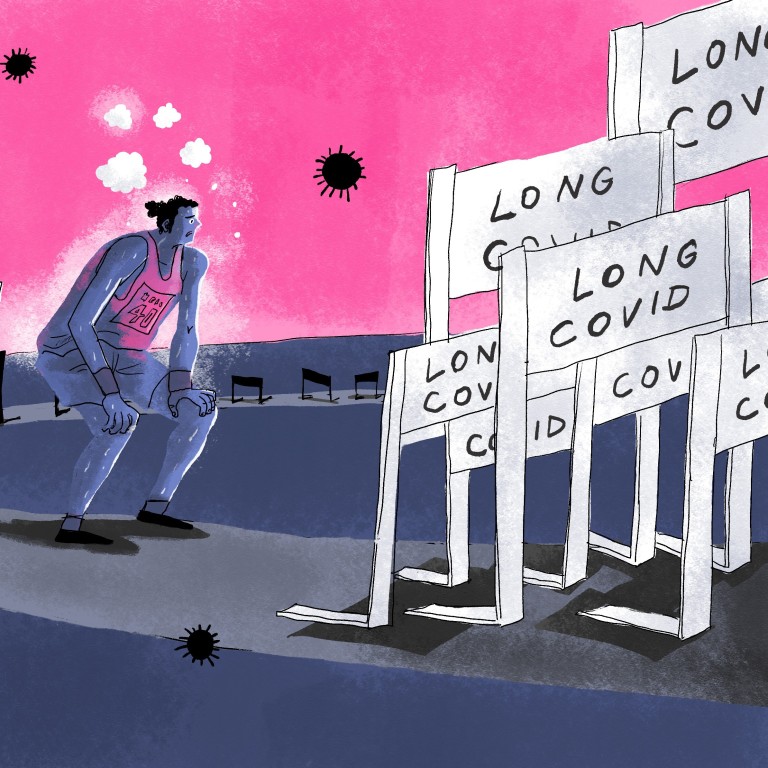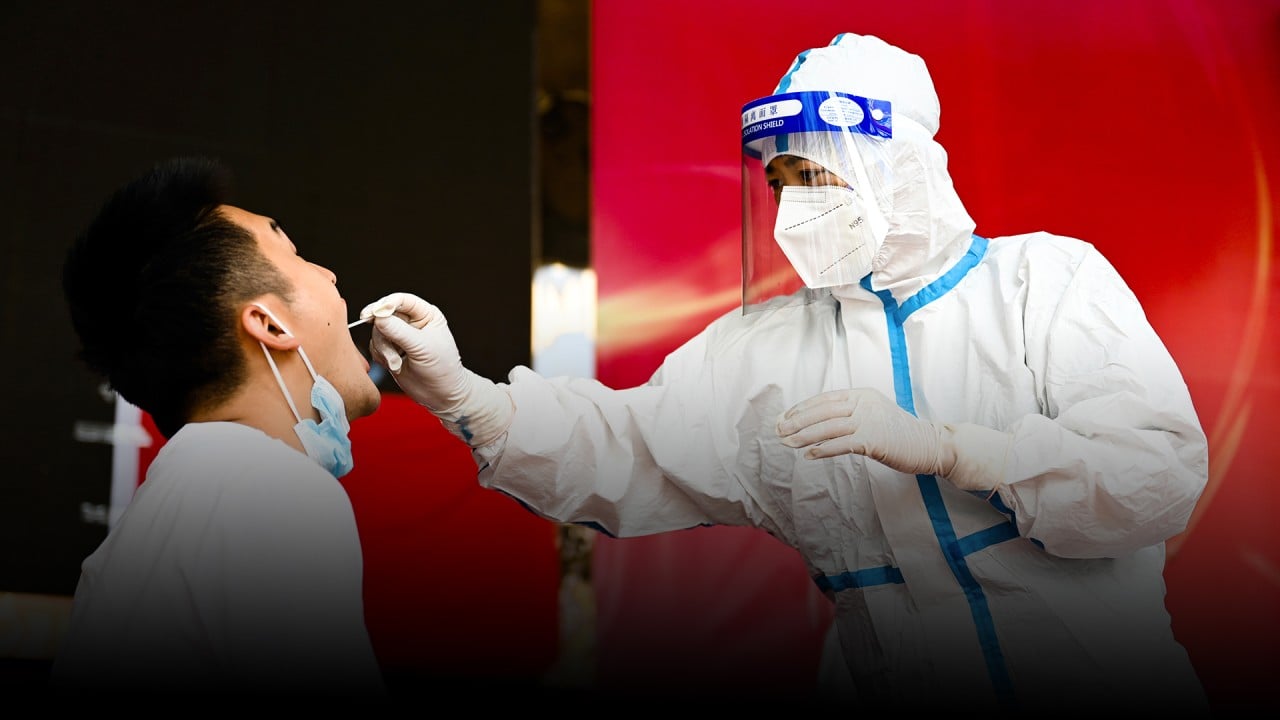
The growing problem of Covid-19’s ‘long-haulers’ a global challenge
- Studies in China and around the world show symptoms can linger for up to 12 months in some patients
- The ‘long Covid’ sufferers need of support and the impact on the workforce is also in question
This is the second part of a series on challenges China faces in its battle against Covid-19. Here, Zhuang Pinghui looks at what international research is revealing about the problem of “long Covid”.
What is ‘long Covid’? Hongkongers share mystery post-illness tales
The “long-haulers” find symptoms usually emerge three months from the onset of Covid-19, last for at least two months and cannot be explained by an alternative diagnosis.
“It is going to be an issue because there are just so many people who are affected. We have been trying to save people in intensive care or [from] being hospitalised, but we will need to focus on how to get these patients better once the dust settles a little bit,” said Angela Cheung, senior scientist and professor of medicine at the Toronto General Hospital Research Institute.
Cheung is co-leading a longitudinal study called CanCOV which is following the Covid-19 journey of about 17,000 subjects. “Many people still have residual symptoms. The more severe the disease is, the longer term issues they have. Those who are not hospitalised can develop long Covid, too,” she said, adding that the illness had an “episodic nature”.
London-based IT professional Ondine Sherwood, who founded the LongCovidSOS campaign group, said she was still experiencing recurring symptoms after developing a mild case of Covid-19 in March last year. She would feel better and a couple of days later, the same symptoms would return.
“I’ve certainly felt much more like my normal self over the past six months, but I still get setbacks. I wonder whether this might be permanent, whether I’ve got some kind of damage, and whether I will always have a vulnerability to getting my immune system going again, which is like an autoimmune disease in a way,” Sherwood said.
There is currently no treatment for long Covid because its cause is still unknown. Scientists are pursuing different lines of research to figure out why, after contracting the virus, some people go on to develop post Covid-19 condition while others do not even show symptoms during the infectious phase.

01:38
Global Covid-19 death toll passes 5 million, but experts say actual number is much higher
One theory is that the virus sticks around in some parts of the body beyond acute infection and causes persistent symptoms. Some scientists suspect it is caused by an overactive immune system that gets confused and attacks the body’s own tissues and organs. Another possibility is that the virus causes initial damage in some patients – for instance to the nervous system – which can lead to a longer recovery time.
China, where Covid-19 was first identified, has yet to publish any large-scale data on patients suffering lingering symptoms.
A study published in August looking at 1,276 hospitalised Covid-19 patients in the Jinyantan Hospital in central Chinese city of Wuhan, found most symptoms disappeared within 12 months.
However, half of those patients – especially those who had been critically ill – were still experiencing at least one persistent system.
The Chinese health authorities have said Covid-19 survivors must go through rehabilitation to improve their physical and mental health and undergo regular checks after being released from hospital.
There is no consensus among scientists on the likelihood of developing long Covid. There have been dozens of studies around the world, but with significantly varied results.
What next for zero-Covid China, as herd immunity faces Delta hurdle?
Using de-identified medical records of almost 274,000 Covid-19 survivors in the US, Oxford University researchers found more than one-third had long Covid symptoms three to six months after their acute infection, according to a study released last month.
Data from Britain’s Office for National Statistics suggested 1.1 million people experienced long Covid during the four weeks to September 5. More than 11 per cent of the country’s survivors were estimated to suffer activity-limiting symptoms from post Covid-19 condition.
A systematic review of 57 studies worldwide led researchers at Penn State College of Medicine in the US to estimate that more than half of the 236 million people diagnosed with Covid-19 since December 2019 would suffer long Covid symptoms up to six months after recovering from their illness.
While the many different studies around the world have resulted in a wide range of estimates, all call for health care organisations and health service providers to prepare for a potentially large number of long Covid sufferers who will need care for different symptoms over an uncertain period of time.

06:05
As more countries ditch ‘zero-Covid’ policy, why is China opting to ‘wait and see’?
John Marshall, professor of surgery at the University of Toronto – who wrote the first draft of the WHO’s clinical case definition released earlier this month – said more understanding about the prevalence, natural history or burden of sustained illness would be needed to develop adequate responses.
“From a health care system perspective, I think the impact will be modest, since patients with the syndrome usually remain at home. The greater potential impact is on the workforce and on the need for rehabilitation,” he said.
“Without more epidemiological data, it is difficult to make plans, or even to know whether there is likely to be a need for a large-scale response, and so this is why so much effort at present is directed towards description and epidemiologic understanding.”
University of Birmingham researcher Dr Shamil Haroon, who is co-leading a British study into what treatments are most likely to benefit people with long Covid, said health care systems should be prepared for a substantial number of cases, even using conservative estimates, because of the high cumulative incidence of Covid-19 globally. More than 246 million people around the world have been confirmed as infected.
“Health care systems will therefore need to rapidly develop services to support people with long-term symptoms and clinical complications associated with Covid-19,” said Haroon, whose study is also testing supportive treatments to improve the quality of life for long Covid sufferers.
“This will include providing lay-friendly and culturally appropriate web-based information about the self-management of long Covid symptoms, and the development of clinical guidelines for long Covid assessment and management.”
Ruili, on China’s border with Myanmar, hit by dual hardships in pandemic
Haroon also recommends the establishment of multidisciplinary long Covid clinics in both primary and secondary care, as well as appropriate referral pathways, which will require significant expenditure and commitment by health care providers and commissioners, he said.
“The treatment will be supportive rather than curative as there are currently no known curative treatments for long Covid. Health care providers will need to design these services in a sustainable and manageable way to prevent them being overwhelmed by the number of individuals potentially in need of care.”
No mixed Covid-19 booster shots for China until ‘scientists are sure’
Paddy Ssentongo, who led the Pennsylvania State University study into the prevalence of long Covid, said all countries should push for one-stop multidisciplinary treatment centres for the condition.
But, just like the existing barriers to medical access, long Covid treatment centres and clinics may still be concentrated in urban areas. “Traditional health care disparities will still perpetuate long Covid treatment, even in the United States,” said Ssentongo, an assistant professor of engineering science and mechanics.
“While the rates of long Covid were similar between high-income countries and low and middle-income countries, the disability-adjusted life years – a metric of disease burden – will be higher in the latter,” he said.
Covid-19 ‘faultlines’, ‘hobbled’ recoveries push IMF to downgrade outlook
Dr Satish Raj, a professor of cardiac sciences with the University of Calgary, is leading an investigation into individuals suffering with autonomic problems after recovering from Covid-19. He said that meeting the needs of long Covid patients would be a challenge for most of the world’s health systems, with not a lot of excess money to “throw at the problem”.
“The first thing needed is research resources, infrastructure and money, to better study these patients to understand what is wrong and where the problems are,” he said.
Addressing the needs of long Covid patients could also improve support for patients with other viral infections, which can also lead to similar debilitating conditions, including myalgic encephalomyelitis/chronic fatigue syndrome (ME/CFS).
“They have suffered with disjointed care. There is an opportunity for health systems to not only improve care for patients with long Covid, but also patients with other chronic and poorly understood disorders,” Raj said.
While there have been anecdotal reports of some long Covid patients improving after vaccination, there is no scientific conclusion on its impact. However, researchers agreed that the best way to deal with long Covid was by not getting it in the first place – through vaccinations and public health measures such as social distancing and masks.




